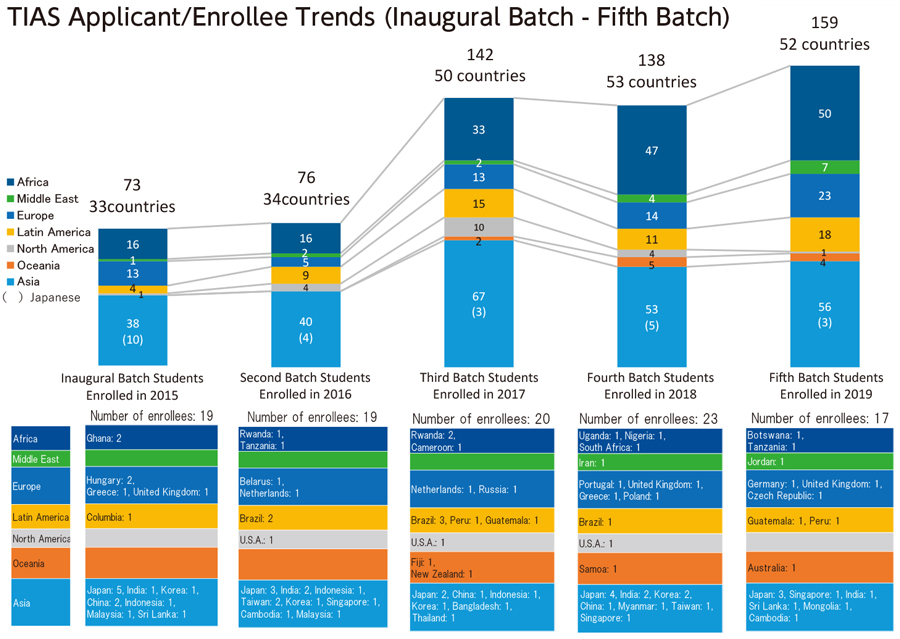Records(2015-2021)
・Acceptance of official students
Figure 1 shows data on applications and admissions from the 1st batch students of Sport and Olympic Studies, established in October 2015, to the 5th batch of students admitted in October 2019. The application rate has been increasing and for the fifth batch, the school’s application-to-enrolment ratio for the fifth batch was nearly 8.0. Many applications were received from Asia and Africa.
・The admitted students were selected from all around the world in a balanced way.
Their former occupations before admission include educational institution, sport-related companies, and student. Some worked for government agencies, Olympic and Paralympic committees, NFs, and universities, and others were Olympians. We can see students with diversified backgrounds have been admitted.
・Graduates
A total of 95 students from the 1st batch to the 5th batch have graduated from TIAS.


Outcomes(2015-2021)
●Global vision and global practical skills
A questionnaire survey of those students who completed this master’s course was completed. Students answered that this programme had helped them, in particular, build an understanding of international affairs, global issues, and sport missions; and with the acquisition of a global vision and global practical skills, with a focus on people living in local communities. These answers demonstrate that the TIAS’s goal of fostering human resources was achieved.
●Students ready to demonstrate their capability in the international sports community immediately after graduation
Graduates very active in global sports communities affirm the above points. Some belong to organisations related to the IOC and the IPC such as the Organising Committees for Olympic and Paralympic Games, the Olympic Broadcasting Services (OBS), and the Agitos Foundation, government agencies such as the Ministry or Agency of Sport in different countries, Ifs, NOCs, NPCs, and sportrelated companies. In Rwanda, one graduate assumed the post of Under Secretary of the Ministry of Sports. Some graduates intend to be researchers, but many of them engage in sport-related jobs as work-ready personnel (See section ‘Careers of Graduates’).
●Establishment of networks with the International Olympic Committee
A deep relationship with the IOC has been built. The University of Tsukuba awarded an Honorary Doctorate to IOC President Thomas Bach in 2016. In addition, persons involved in the TIAS and graduates belong to IOC-related committees so that more networks have been built. Vice President Caroline Benton became the first Japanese Olympic Education Commission member in 2018, while then-TIAS Academy Director Sanada became a Study Selection Committee member of the IOC Olympic Studies Centre in 2019. Networks not only with the IOC, but also with the IPC, Olympic and Paralympic Committees, and government agencies have been built, resulting in extremely precious tools for the Japanese sports community
